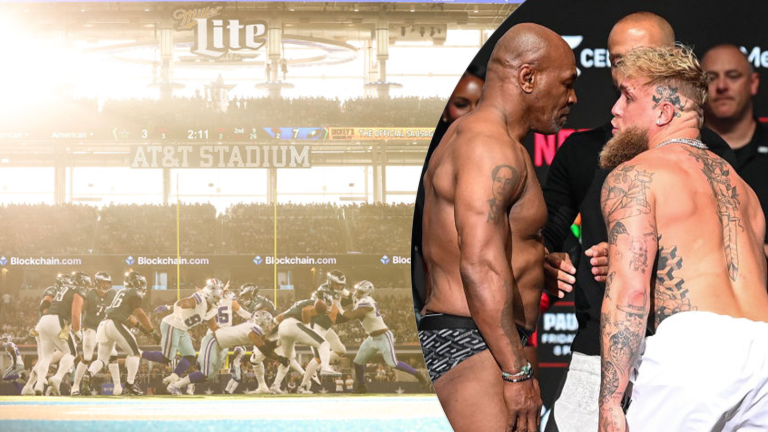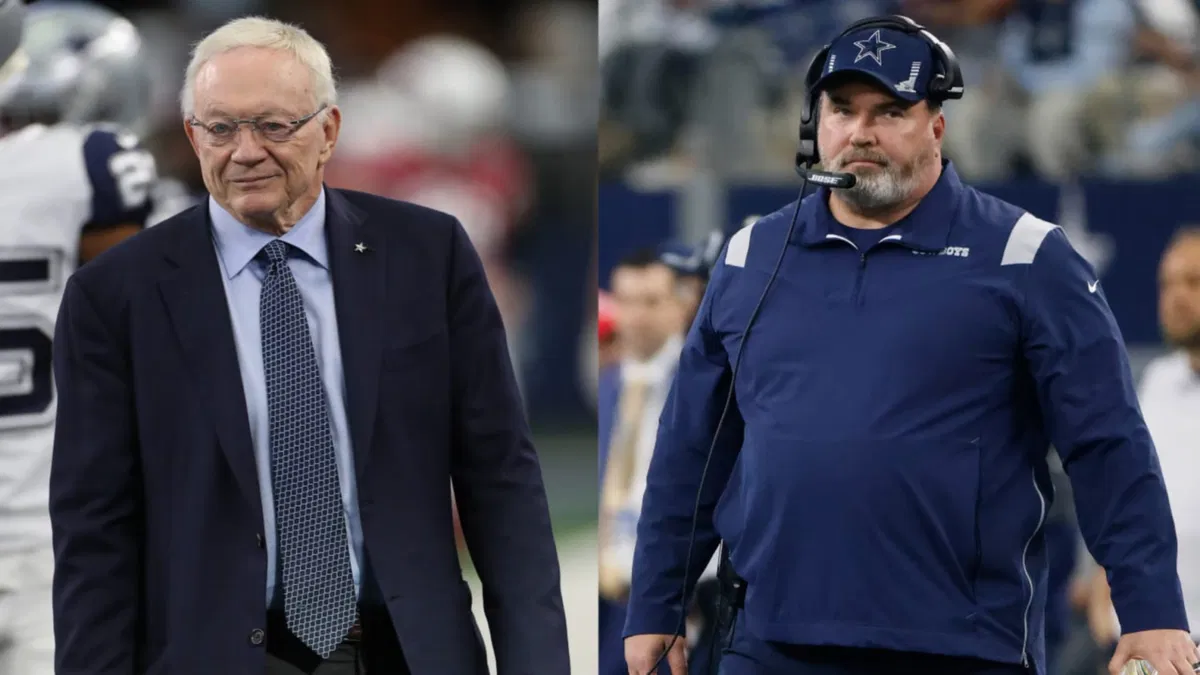In a surprising turn of events, the Dallas Cowboys, under the direction of owner Jerry Jones, have found themselves at the center of controversy after their iconic AT&T Stadium was used to host the much-hyped Jake Paul boxing match — with some unexpected consequences. As the event unfolded, Cowboys fans, sports analysts, and even critics of the franchise expressed their discontent after the stadium, usually reserved for NFL games, was altered in a way that many felt undermined the legacy of one of the NFL’s most storied teams.
AT&T Stadium, often referred to as “Jerry World” for its association with Cowboys’ owner Jerry Jones, is a state-of-the-art venue known for hosting some of the biggest sporting events in the world. From Super Bowls to high-profile concerts, the stadium has become a symbol of success and luxury in the world of sports.
However, the decision to use it as the venue for a Jake Paul boxing match has led to widespread criticism, particularly from Dallas Cowboys fans who felt the venue was compromised by the circus-like atmosphere surrounding the controversial social media star’s boxing career.
While Jones has long been known for his entrepreneurial approach to maximizing revenue streams, even if it means exploring unconventional events at the stadium, the boxing match created a stark contrast to the proud football legacy of the Cowboys.
The most eye-catching aspect of the event was the setup within the stadium. In an attempt to accommodate a more intimate setting for the boxing match, large curtains were hung across portions of the stadium, reducing the visibility and grandeur that AT&T Stadium is typically known for. The use of these curtains has been seen by many as a glaring departure from the usual polished image associated with the Cowboys’ brand.
Fans were quick to notice that the stadium, which usually offers a wide-open view and a massive atmosphere for Cowboys games, was now divided into smaller, less impressive sections. The perception of luxury and the unmatched viewing experience that AT&T Stadium typically offers was significantly diluted by the presence of these barriers. The venue, which normally shines under the bright lights of NFL games, now appeared to be catering to a much smaller, more niche crowd.
Critics argue that this choice detracted from the status of AT&T Stadium and symbolized a shift toward commercialization that may not align with the true identity of the Dallas Cowboys. With the curtains and overall setup designed for a less prestigious event like a Jake Paul boxing match, many felt that the grandeur of the stadium was undermined.
Jake Paul, a controversial YouTube personality turned professional boxer, has amassed a following that is both loyal and polarizing. His transition into the boxing ring, and subsequent rise as a fighter with a large social media presence, has been met with mixed reactions across the sports world. While his boxing bouts have garnered significant attention, they have often been criticized for lacking the competitive integrity that defines traditional boxing.
Paul’s matches, including the one held at AT&T Stadium, have been more about spectacle than athleticism, and this spectacle-focused approach is at odds with the professional football atmosphere that Cowboys fans are accustomed to. The decision to host such an event at the home of the Dallas Cowboys may have appealed to a certain fan demographic but left many feeling that the integrity of the venue was compromised.
Jerry Jones, the face of the Dallas Cowboys and one of the most influential owners in professional sports, has always been a shrewd businessman. His willingness to push the envelope and leverage the Cowboys’ brand for financial gain has been a cornerstone of his tenure as team owner. From partnerships with luxury brands to hosting the largest concerts and events in the world, Jones has continuously found ways to keep the Cowboys at the forefront of the entertainment world.
However, this decision to host a Jake Paul boxing match at AT&T Stadium has sparked debate about where the line should be drawn between entertainment and tradition. While Jones has often succeeded in drawing large crowds and maximizing profits, the use of the stadium for such a polarizing event might have strained his relationship with some of the more traditional Cowboys fans who feel that the sanctity of AT&T Stadium should be reserved for the team’s NFL games.
The backlash from Cowboys fans has been palpable. Social media platforms were flooded with opinions criticizing the event and the alterations to the stadium. Many fans expressed disbelief that a stadium of such prestige would be used for an event that they felt cheapened its legacy.
“I’ve been a Cowboys fan for decades, and I’ve never seen the stadium look like this,” one fan tweeted. “The curtains make it feel like a discount version of the place we love. It’s one thing to host a concert or an event, but this is a step too far.”
While some fans took to defending Jerry Jones’ commercial strategy, it’s clear that the use of the stadium for such an event has created a divide within the Cowboys’ fanbase. Some argued that Jones is simply evolving with the times, embracing a broader audience and generating revenue, while others expressed concern that the team’s rich football tradition was being sidelined for the sake of entertainment gimmicks.
As the dust settles after the Jake Paul boxing match, it remains to be seen how this event will affect the long-term legacy of AT&T Stadium and the Dallas Cowboys. Jerry Jones has proven time and time again that he is willing to take risks to keep the Cowboys relevant both on and off the field. However, this recent controversy may serve as a reminder that not all risks pay off, especially when they clash with the loyal fanbase’s expectations.
Whether this event was a one-off or part of a larger trend remains to be seen, but one thing is clear: The combination of sports and spectacle will continue to challenge the way we view iconic venues like AT&T Stadium. In the case of the Dallas Cowboys, the question now is whether the drive for commercialization might eventually undermine the very legacy that built the brand.




